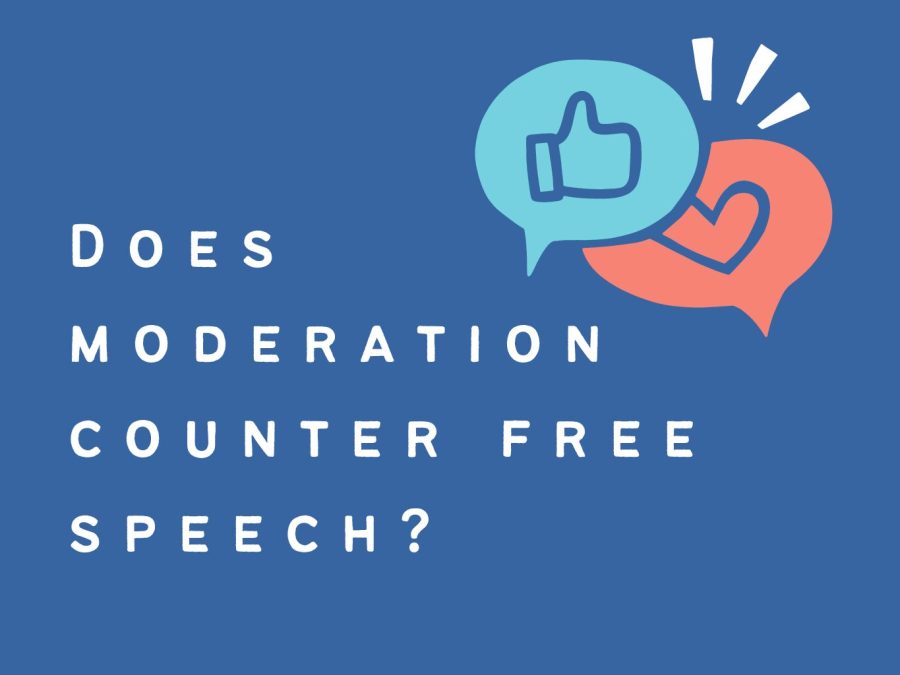The Supreme Court Blocks A Texas Social Media Law
Texas lawmakers clash with the Supreme Court majority decision in debates about regulation and the rights for private speech. Graphic by K. Peechu.
June 3, 2022
On Tuesday, May 31st, the U.S. Supreme Court blocked a Texas social media law from taking place, which attempted to restrict social media platforms’ ability to moderate content.
The Court cast a 5-4 vote that granted the emergency request from the technology industry and ultimately blocked the order that would have let the law take hold. The 5 votes in favor of granting the request consisted of an unusual lineup of Chief Justice John Roberts, Amy Coney Barrett, Stephen Breyer, Brett Kavanaugh, and Sonia Sotomayor. Against the request was liberal Justice Elena Kagan alongside conservative justices Samuel Alito, Neil Gorsuch, and Clarence Thomas.
The Texas law would have barred various platforms such as Facebook, Twitter, and Instagram from blocking content on the basis of viewpoint. Governor Greg Abbott affirmed the law’s importance in the context of “a dangerous movement by social media companies to silence conservative viewpoints and ideas.”
However, the Supreme Court order ultimately resulted in a loss for Texas, despite the state insisting that the law, known as HB 20, did not violate the First Amendment in the face of a federal district court temporarily stopping state officials from implementing the law.
Justice Alito explained that the views and implications of the law were so significant that the need to address them was inevitable.
“This application concerns issues of great importance that will plainly merit this court’s review,” he wrote. “Social media platforms have transformed the way people communicate with each other and obtain news. At issue is a groundbreaking Texas law that addresses the power of dominant social media corporations to shape public discussion of the important issues of the day.”
The Big Tech interest groups filing the emergency request to block the law were NetChoice and the Computer & Communications Industry Association, who argued that the law would force platforms to make room for just about everything, calling it “an unprecedented assault on the editorial discretion of private websites.” In court papers, the groups warned that the law “would compel platforms to disseminate all sorts of objectionable viewpoints—such as Russia’s propaganda claiming that its invasion of Ukraine is justified, ISIS propaganda claiming that extremism is war- ranted, neo-Nazi or KKK screeds denying or supporting the Holocaust, and encouraging children to engage in risky or unhealthy behavior like eating disorders.”
These groups argued that the Constitution protected their rights in regulating platform content, similar to newspaper publication management, and the HB 20 law violated the First Amendment.
The Computer and Communications Industry Association stated that the Supreme Court’s final decision upholds over 200 years of free-speech principles, praising it in the context of historical government violation of private speech.
“We appreciate the Supreme Court ensuring First Amendment protections, including the right not to be compelled to speak, will be upheld during the legal challenge to Texas’s social media law,” said CCIA President Matt Schruers. “The Supreme Court noting the constitutional risks of this law is important not just for online companies and free speech, but for a key principle for democratic countries.”
Despite the arguments of the tech companies, the state countered that HB 20 did not violate the First Amendment as it does not want to regulate the companies’ free speech, but rather the platforms’ conduct towards their users, deeming them “common carriers”, essentially describing commercial enterprises with services or goods open to the general public, in the way railroads and phone companies are.
Last week, a separate Florida law was caught in a case at the U.S. Court of Appeals for the 11th Circuit, where Judge Kevin C. Newsom wrote for the panel, “Social media platforms exercise editorial judgment that is inherently expressive. When platforms choose to remove users or posts, deprioritize content in viewers’ feeds or search results, or sanction breaches of their community standards, they engage in First Amendment-protected activity.”
The Texas law was initially blocked by a preliminary injunction issued by Judge Robert Pitman of the Federal District Court in Austin, who wrote “Social media companies have a First Amendment right to moderate content disseminated on their platforms.” On May 9th, the state’s appeal was argued in the U.S. Court of Appeals for the Fifth Circuit, and two days later, a three-judge panel of the court allowed the law to go into effect despite some division.







